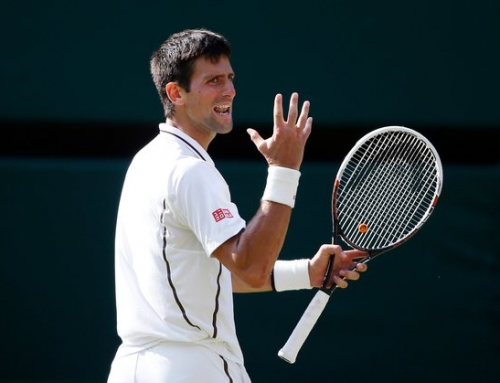 Before the French Open, no one expected Rafa to relinquish number 1. He won the Australian Open. Despite the defeat at Madrid, many wondered if Roger was really ready to take on Nadal at the French Open in a best of 5 set match. Most people didn’t expect Nadal to lose before the finals, and some hoped Federer had finally figured out Nadal.
Before the French Open, no one expected Rafa to relinquish number 1. He won the Australian Open. Despite the defeat at Madrid, many wondered if Roger was really ready to take on Nadal at the French Open in a best of 5 set match. Most people didn’t expect Nadal to lose before the finals, and some hoped Federer had finally figured out Nadal.
Once Roger won the French Open, Nadal still had a reasonable lead over Roger, thought certainly not as big as it was prior to the French. Realize that Nadal was, prior to the French, the reigning champ at the French, Wimbledon, and the Australian Open. Federer kept it as close as he did because he was in the finals of all those events.
Now that Nadal has withdrawn from Wimbledon, most people know that Roger has a chance to become number 1. Let’s see how this works out.
A player’s ranking is based on the best 18 tournaments in the past 52 weeks. When a player plays a tournament that they have played before, they are said to be defending points. Thus, Rafael Nadal, coming into the French Open as reigning champ, had 2000 points to defend because he won the title last year. If he didn’t win again, he would lose points relative to last year. He lost in the fourth round, and earned 180 points. That means, for his total points, he lost 1820 points. Federer, on the other hand, was a finalist last year, and earned 1400 points. Those 1400 points dropped off when he won, and was replaced by 2000 points for winning the title. Thus, Federer gained 600 points over last year.
For players ranked high enough, all Grand Slam events and all Masters 1000 events must be counted. There are 9 Masters events not including the year-end Masters which appears to count optionally to the rankings. Thus, 13 of 18 tournaments are accounted for top players. Players that are ranked very low often can’t qualify for any of the Masters 1000 events, so they simply take their best 18.
Prior to Wimbledon, these were the rankings of the top 3 players:
Nadal 12,735
Federer 10,620
Murray 9,230
Because Nadal could not defend Wimbledon, and because Wimbledon must count as one of his 18, he loses the 2000 points, so regardless of what happens, Nadal will have 10,735 points. That number is still greater than Federer’s 10,620 points. If Federer reaches the final of Wimbledon but doesn’t win, his point total remains unchanged. His 1400 points from last year will drop off and be replaced by 1400 points from this hypothetical final.
Now suppose Federer does win Wimbledon, as many predict he will do. He will have 2000 points, to replace the 1400 points when he reached last year’s final. This is a net gain of 600 points. 10,620 + 600 = 11,220. That is greater than 10,735 and Roger becomes number 1 and Nadal falls to number 2.
Here’s the interesting part. Murray was a quarterfinalist last year, and earned 500 points. Let’s say Roger wins and he beats Murray in the finals. Murray would get 1400 points for being in the final. He would gain 1400 – 500 = 900 points. Add that to his current total, and you get 10,130 points. That is about 500 points less than Nadal, so Murray would remain ranked 3rd.
But suppose Murray wins, and Roger is runner up. Murray’s win would give him 2000 points, minus the 500 points that drops off from last year, or a net gain of 1500 points. Murray’s total would be: 9,230 + 1500 = 10,730. Nadal has 10,735 and would remain number 1 by the slimmest of margins. Once another tournament drops off (Nadal is expected to miss a month), Murray could become number 1. In this scenario, Roger would remain at 10,620 and be 115 points behind Nadal, and thus, be number 3 in the world.
Let’s repeat that again. If Roger loses Wimbledon to Andy Murray, then Rafael Nadal is still number 1, Andy Murray is number 2 (only 5 points behind), and Roger Federer is number 3. Now, these points are very close. Roger would only be 115 points behind Rafael Nadal. Thus, both Murray and Federer could move past Nadal and be jockeying for number 1 the rest of the year.
Let’s make it more interesting. Let’s say Djokovic wins. Djokovic lost in the second round last year and only earned 70 points. If he won, he’d gain 1930 points for a total of: 7860 + 1930 = 9790 points. To do this, Djokovic would have to beat Federer or Federer would have to lose early (they are in the same half). If he beats Federer in the semis, then Federer loses 500 points, and has 10,120 points.
Let’s say Djokovic beats Murray in the final. Murray gains 900 points for being in the final and goes to 10,130 points. That again moves Murray to number 2. Rafa would be number 1 at 10,735, Murray at 10,130, Federer at 10,120, Djokovic at 9790 points. In other words, short of Federer or Murray losing early and Djokovic winning, he pretty much stays at 4. Now if Murray loses in the quarters (meaning has the same result as last year), Djokovic would move to number 3. He could move to number 2 if Roger lost in the quarterfinals or earlier (reaching the quarters would mean losing 900 points, and put Fed at 9,720).
In short, Roger needs to win if he is to get to number 1 after Wimbledon. He may become number 1 anyway because Nadal is expected to skip a month and thus lose his 1000 point result for winning in Canada. Federer lost very early in Canada and basically has no points to defend there, and could move ahead, if Nadal doesn’t try to come back and play Canada (which seems unlikely).
So let’s do the two “likely” scenarios.
Roger beats Andy. Then, Roger becomes number 1, Rafa becomes number 2, and Andy stays at 3.
Andy beats Roger. Then, Rafa barely stays at number 1, Andy M. goes to number 2, and Roger actually moves to number 3.
They could both move ahead of Rafa depending on when Rafa returns back on tour.
Neat, eh?







![[Wimbledon, QF] Murray scraps out 5-set win over Verdasco to reach semifinals](https://www.essentialtennis.com/wp-content/uploads/2013/07/20130703murray-500x383.jpg)